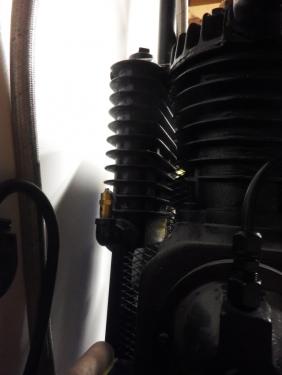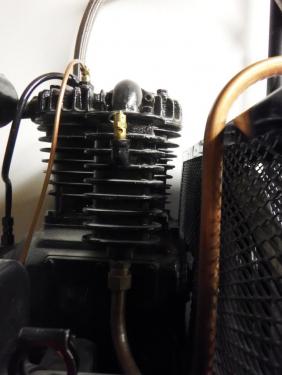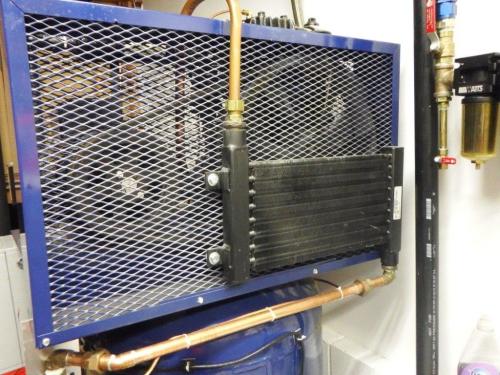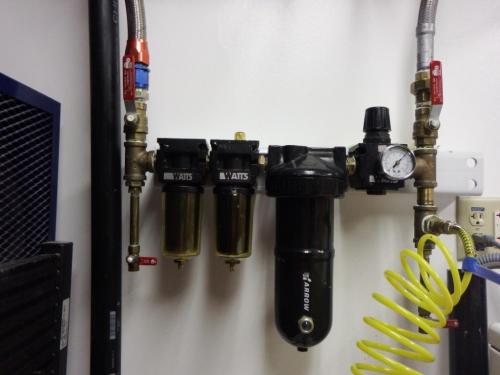(05-07-2014, 08:16 PM)EdK Wrote: I don't know what an after cooler looks like so is that something I should be concerned about?
Ed
Hope you don't mind yet another comment from me.
Two of the things that happen when you compress air is that (a) the compressed air and everything associated with compressing it gets hot and (b) any water vapor that is in the air does not go away.
The heat from (a) is a problem because high heat is not a good thing in general for motors, pumps, gears, etc. and heat also makes addressing (b) difficult.
To address (a) the compressor pump is usually finned, has a cooler on the output and the large pulley that drives it usually has the spokes in the shape of a fan blade to move air over the pump and coolers. There may also be an after cooler on the output in an attempt to reduce the air temperature before it goes into the tank.
I will use my 2 stage compressor as an example. Between the output of the first stage and the input of the second stage there is a cooler. And obvious attempt to get rid of some of the heat generated by compressing the air in the first stage and to give the second stage cooler, denser air to work with.

On the output of the second stage there is another cooler that attempts to get rid of some of the heat generated by compressing the air in the second, final stage before it goes into the tank. This is what I would expect to see on any reasonable pump and in my mind neither cooler is an aftercooler.

In my case when I ordered the compressor I had them add an aftercooler. It goes after the second stage cooler and before the tank. Note that it is directly over the drive pulley and is therefore in the cooling air flow that the pulley generates.

You may ask "How hot can this get? After all its just air." I can suggest that the input to my aftercooler ... that would be the temperature of the input fitting to the aftercooler and reflects the temperature AFTER the first and second stage coolers has done their jobs and the temperature of the air that would normally be going into the tank ... is over 260 degrees Fahrenheit according to my heat measurement gun. The temperature of the aftercooler output fitting is somewhere in the neighborhood of 80 - 90 degrees Fahrenheit. The ambient temperature of the basement is usually 70 or less degrees Fahrenheit.
(b), water vapor, is the other problem as paint guns, plasma cutters, blasting cabinets and other things that might consume the compressed air do not like moisture. When you take 14.7 psi air and compress it to 175 psi you are taking roughly 10 cubic feet of air and making 1 occupy 1 cubic foot. You have also taken all of the water vapor that was in that 10 cubic feed and putting it in the same space. In other words your 80 gallon air tank now has a heck of a lot of water vapor in it along with all that air.
Which brings us back to the hot air issue ... yes, at this point you are thinking I am full of it. The cooler air is the less water vapor it is willing to support. Cooling the air will cause it to 'rain'. If you cool the air down a lot before it goes into the tank then hopefully it rains in the tank. If you don't cool it down before it goes into the tank then it may rain in the tank if you are lucky ... after all it is a big tank and is cool to start with ... or it may just pass thru the tank and move on to the lines and what ever is down stream.
Is it really that big a problem for the home air system? If you don't use the compressor very often the vapor laden air has plenty of time to dwell in the tank, cool and rain. If you are doing things that are ambivalent to water vapor, I think lots of air tools with proper lubrication may fall into this category, again no problem. If you have some other means of getting the moisture out before it is consumed ... like a desiccant dryer ... then it might not be an issue.
However if you are doing anything that does not like water vapor it is a PITA to get rid of. I will suggest that you don't have to go thru much in the way plasma cutter consumables or gum up you blasting cabinet or mess up a paint job to decide that you need to pay the price to resolve the water vapor issue.
So an aftercooler or a refrigerated air dryer is not a "Must Have" but more along the lines of "If you do this or that then it is a very nice to have" item.
Just to give you an idea of what else you might want to consider ... note again not "Must Haves" ... you may want an air filter and a regulator that goes between the tank and the air distribution system. This would be in addition to any "point of local use" stuff you might employ. What I have looks like this ...

The 175 psi air from the tank comes in on the left side, goes thru a 5 micron filter, then a .01 micron oil and water separator and filter, then to a desiccant dryer, thru a regulator that is set at about 130 psi and finally back up to the 1 inch copper distribution system to the garage and the other part of the basement. Note that "oil injectors" are a "point of local use" only and I have a couple of hoses that are specifically for that purpose. I did not spend all that time and energy getting a clean air system to then pollute the entire system with oil.
I am not suggesting you need any of this to have an effective system. All I am presenting here is one example of what can be done and why I did it. Please feel free to pick thru this mess and decide what might be of value to you.
Arvid









![[Image: IMG_0393.jpg]](https://lh5.googleusercontent.com/-SRFhogCcdcM/U2wrhWkfQLI/AAAAAAAACDI/1gm3qll4xXc/s1280/IMG_0393.jpg)